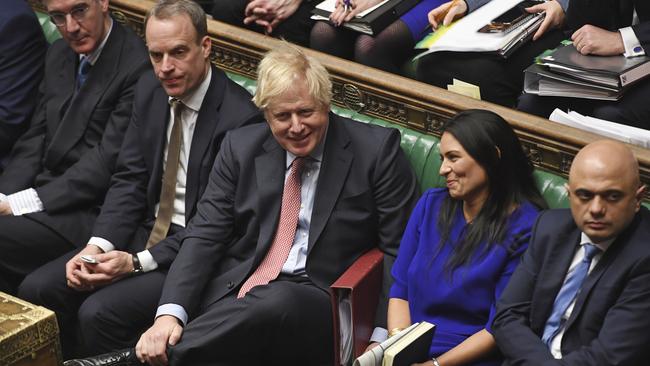
Severing or radically altering a 48-year relationship can be painful and complicated. The road to Brexit hasn’t been smooth, with much angst and many false starts. But now that Brexit is upon us the world needs to consider how to make the most of it. Fortunately for Australia we are already well advanced in doing so.
Although Britain formally leaves the EU on Friday, transition arrangements apply for the remainder of ths year, with the UK effectively remaining inside the EU single market and Customs union during that time. Come next year, all legal trade relationships with Britain start afresh. During the next 11 months the UK will need to decide what other nations are priorities to negotiate and settle new trade terms with.
Happily, Australia is at or near the front of the queue. We have already settled some agreements with Britain that will come into operation in January 1 next year. These will ensure continuity of co-operation on nuclear issues (uranium exports), access for Australian wines and mutual recognition of certain standards.
We also are well placed to secure a comprehensive and ambitious free-trade agreement between Australia and the UK. Although Britain has legally been unable to start formal trade negotiations while still a member of the EU, Australia innovated and established a trade working group between our nations to ensure we would be ready to start formal talks when the time came. Following Brexit, and as soon as the British cabinet agrees on a mandate for negotiations, Australia is primed to get the ball rolling and will move to settle an FTA as quickly as possible.
Given the geographical distance and dramatic changes to the global economy, especially within our region, some will ask if an FTA with Britain will be worth worrying about. History informs us of what may be possible.
Australia was a casualty of Britain’s entry into the EEC. In 1973 the UK was Australia’s third largest two-way goods trading partner. Now it is our 12th. Some of that change in relativities is for good reason. We have dramatically expanded our exports and trade with many other nations, especially within our own Indo-Pacific region. However, much of it is because British consumers turned away from Australian produce when high tariffs and low quotas were imposed as a result of EU membership.
In many areas of agricultural trade we went from being a significant supplier of goods to Britain to losing almost all our market share. During the past 48 years beef exports to Britain plummeted by 96 per cent, sheep meat by 70 per cent, rice by 92 per cent and wheat by 99 per cent. Exports of sugar and butter were eliminated.
Percentages can be misleading. These aren’t. The crash in sales was significant in terms of the sheer volume of exports lost, too: about 98,000 tonnes of beef, 18,000 tonnes of sheep meat, 24,000 tonnes of rice, 513,000 tonnes of wheat, 415,000 tonnes of sugar and 32,000 tonnes of butter. The lost trade of the past 48 years presents new opportunities for the future.
Will we return to such volumes of agricultural trade? Possibly not. The diversification of opportunities open to our farmers now means that agricultural exporters may not look to the British market as they did previously, especially thanks to the opportunities created by other Coalition-negotiated trade deals with China, Japan, South Korea, Indonesia, the US and the Trans-Pacific Partnership countries.
Nonetheless, having more options can be only a good thing for our primary producers. That’s why we will seek the elimination of tariffs, quotas and non-tariff barriers as widely as possible.
What’s more, the success of Australian wine sales to Britain, where one in five bottles sold is Australian wine (despite facing a tariff that doesn’t apply to European wines), demonstrates that there remains a hunger in the UK market for reliable, high-quality Australian produce.
Britain won’t return to being our third largest trading partner but we should aspire for it to re-enter the top 10.
Ultimately, goods trade will be only one part of what makes an FTA with Britain worthwhile. Creating better opportunities for trade in services, a growing part of our economy and a central element of the UK’s, not only makes economic sense but also has potential to take off beyond today’s $15bn value. With a common legal system and language many services businesses, including smaller ones exploring exports for the first time, will see real opportunities in each other’s markets.
Similar opportunities already exist in investment flows. Britain remains Australia’s second largest source of foreign investment at $570bn but is also the second largest destination for foreign investment by Australians, valued at more than $400bn. We also will seek to ensure a thoroughly modern agreement that maximises opportunities for e-commerce and digital trade.
Britain may well be severing some of its ties with Europe but Australia, in addition to seeking to resurrect stronger trade relations with the UK, also seeks to strengthen our ties with the EU. Our pursuit of a trade deal with Britain this year in no way diminishes the importance we place on trying to simultaneously conclude one with the EU. After all, with or without Britain as a member, the EU bloc remains Australia’s third largest trading partner and a vast population centre of hundreds of millions of people with whom we seek to strengthen ties.
While Britain has been married to EU trade policy the population of Australia has almost doubled. We are a bigger, stronger nation that learned from our losses 48 years ago, opened ourselves up to the world and embraced the region in which we live. Now that the British embark on their new journey we stand ready, as old mates, to help them find new beginnings and in doing so create even wider opportunities for businesses, farmers and people across both of our great countries.
Simon Birmingham is the Trade, Tourism and Investment Minister.




A lot can happen in 48 years. It’s far longer than many marriages last. So perhaps it shouldn’t come as a great surprise that on Friday, 48 years after Britain joined the European Economic Community, it will leave the EU.